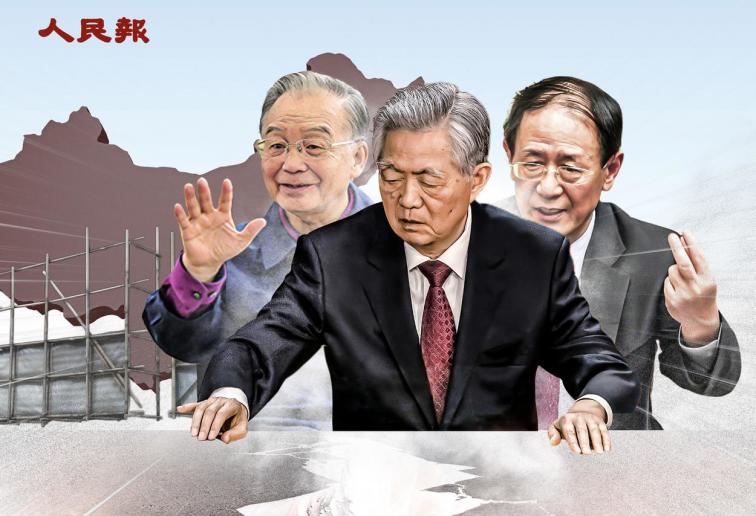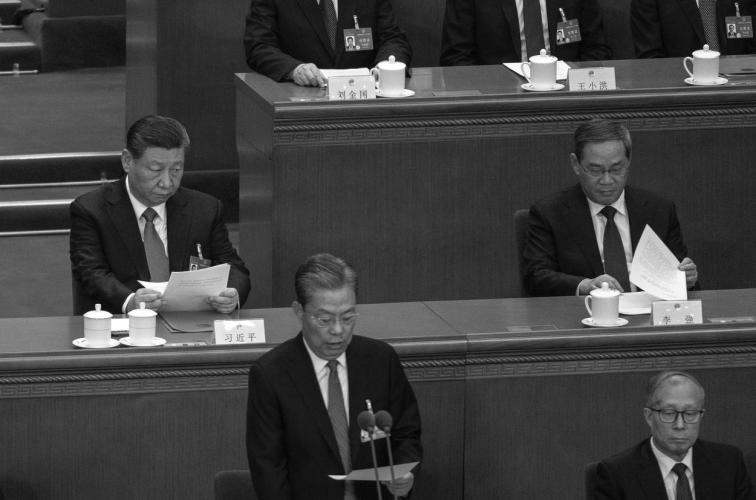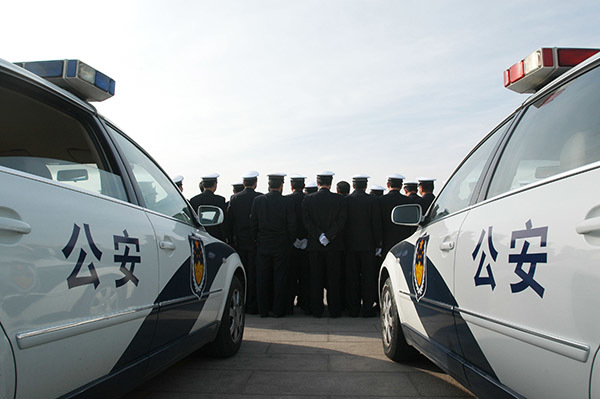March 11, 2023: Senior members of the CCP’s Central Military Commission line up to take the oath at the National People’s Congress. From right to left: Zhang Youxia, He Weidong, Li Shangfu, Liu Zhenli, Miao Hua, Zhang Shengmin. (Lintao Zhang/Getty Images)
[People News] As the Beidaihe meeting approaches, the situation in Zhongnanhai has become increasingly complex. The Fourth Plenary Session is struggling to materialise, meetings of the Politburo Standing Committee are unusual, and there have been frequent personnel changes at high levels. Incidents of high-ranking officials being dismissed, going missing, or dying suddenly have occurred in quick succession, creating a political landscape in Zhongnanhai that resembles a dramatic film plot. Currently, among the 24 members of the Politburo, who hold the highest power, infighting has left them in disarray, looking battered and bruised. Xi Jinping has long stated in his speeches that 'the enemies are within the party.'
Independent commentator Du Zheng published a commentary on July 10 in the Shanghai Report, analysing the shifts in the power dynamics of the Politburo team that Xi Jinping personally arranged during the 20th National Congress of the CCP.
The Politburo members announced at the 20th National Congress of the CCP in October 2022, listed according to the number of strokes in simplified Chinese characters, are: Ding Xuexiang, Xi Jinping, Ma Xingrui, Wang Yi, Wang Huning, Yin Li, Shi Taifeng, Liu Guozhong, Li Xi, Li Qiang, Li Qianjie, Li Shulei, Li Hongzhong, He Weidong, He Lifeng, Zhang Youxia, Zhang Guoqing, Chen Wenqing, Chen Jining, Chen Min'er, Zhao Leji, Yuan Jiajun, Huang Kunming, and Cai Qi.
The article begins by mentioning Ding Xuexiang.
It argues that Ding Xuexiang has recently emerged as one of the candidates to succeed Xi Jinping, but he lacks the capability to govern a region. His current position as a Standing Committee Vice Premier is seen as being thrust into a role without adequate preparation. The central regional coordination he oversees has turned into a failed initiative.
The article asserts that initiatives such as the coordinated development of Beijing-Tianjin-Hebei, the Yangtze River Economic Belt, the Hainan Free Trade Port, the Western Development, the revitalization of Northeast China, and the Guangdong-Hong Kong-Macao Greater Bay Area are all experiencing stagnation or failing to meet expectations, amounting to little more than empty promises.
Additionally, the article discusses Ma Xingrui.
It suggests that Ma Xingrui's future is uncertain, as it is uncommon for a member of the Central Political Bureau to be reassigned mid-term. On July 1, he was removed from his role as Secretary of the Xinjiang Party Committee and given a new assignment.
There is speculation that Ma Xingrui may follow the path of his predecessors, Zhang Chunxian and Chen Quanguo, by taking on a nominal position in Beijing. Given the corruption scandal linked to the Aerospace Science and Technology Corporation, even if he is not investigated, it is likely he will not be given significant responsibilities again, such as succeeding Shi Taifeng as the First Vice Chairman of the National Committee of the Chinese People's Political Consultative Conference.
Another possibility is that Ma Xingrui could be given a prominent role, potentially overseeing the General Office, succeeding Cai Qi, who has been in declining health in recent years.
The article further analyses the shifts in power related to the recent job swap between Shi Taifeng and Li Ganjie.
Shi Taifeng, the former Minister of the United Front Work Department, unexpectedly took over as Minister of the Organisation Department at the end of March this year, while Li Ganjie was reassigned to the United Front Work Department. For Li Ganjie, moving from a core power position to a nominal role in the United Front Work Department raises rumours of an impending investigation, which is seen as a normal occurrence.
The article also highlights the confirmed issues surrounding He Weidong, Vice Chairman of the Military Commission, which may be officially announced during the Fourth Plenary Session of the Communist Party of China. The downfall of two of Xi Jinping's close military allies, including Miao Hua, who was dismissed last year, suggests a disruption in the military's power dynamics.
Lastly, the article mentions He Lifeng, the Vice Premier responsible for the 'money bag.' It argues that He Lifeng is the most skilled and overt in building his own influence among the current members of the Political Bureau.
Chen Min'er, the current Tianjin Municipal Party Secretary who was once viewed as a potential successor to Xi Jinping, previously governed Guizhou and was implicated in a major data corruption scandal, with several of his former subordinates falling from grace. Now, Chen Min'er can only maintain a low profile, let alone build any political influence.
In analyzing the political and legal system of the Chinese Communist Party (CCP), the article notes that Chen Wenqing, the Secretary of the Political and Legal Affairs Committee, has been marginalized by Minister of Public Security Wang Xiaohong and Minister of State Security Chen Yixin, who do not hold him in high regard. Furthermore, their attitudes towards Xi Jinping during critical moments are also uncertain.
As for the other members of the Politburo, the article suggests that there is little of interest to discuss, so it will refrain from detailing each individual.
The article concludes that the members of the Politburo from the 20th National Congress have been severely weakened by internal conflicts within the CCP. Even those who have not faced any scandals are in a precarious position. The infighting and struggles within Zhongnanhai resemble a doomsday scenario.
In his earlier years, Xi Jinping famously stated to the party, 'I believe the only ones who can defeat us are ourselves; there is no second person.' The article emphasises that Xi Jinping is aware that the true adversary lies within the CCP itself.
The article further reveals that an increasing number of officials are being accused of reading politically banned literature, indicating a significant loss of unity and loyalty within the CCP. Additionally, the CCP, fully cognizant of the illegitimacy of its one-party rule, has intensified the prosecution of dissenters on charges of 'inciting subversion of state power' in recent years.
In summary, the article warns that under the pressures of both internal and external challenges, should the CCP resort to military action against Taiwan, its regime could face unexpected crises and potential overthrow at any moment.











News magazine bootstrap themes!
I like this themes, fast loading and look profesional
Thank you Carlos!
You're welcome!
Please support me with give positive rating!
Yes Sure!